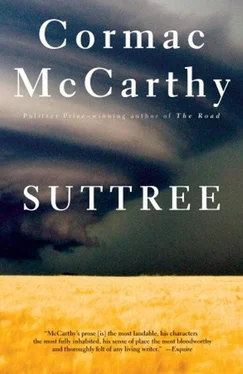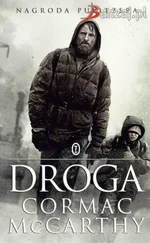He wheeled in through the door, adjusting the blanket as he went. Two men at the counter watched him come. One turned and found something to do and the other rose up from his elbows and stood in charge.
I cant serve you, he said.
Suttree still had his mouth open. He closed it and opened it again. He looked at the bottles. He looked at the counterman.
You better go on, said the counterman.
Where’s the bus station, said Suttree.
Where you left it, I reckon.
Suttree suddenly began to cry. He didn’t know that he was going to and he was ashamed. The counterman looked away. Suttree turned and went out. In the street the cold wind on his wet face brought back such old winter griefs that he began to cry still harder. Walking along the mean little streets in his rags convulsed with sobs, half blind with a sorrow for which there was neither name nor help.
At the bus station he bought his ticket, smoothing out the crumpled bill on the counter, the grave face of the emancipator looking back from the currency. With the change he bought a candy bar and he sat alone on a bench in the empty waiting room in his blanket eating the candy in micesized bites and reading from a black leatherette copy of the Book of Mormon he found in a pamphlet rack. The candy he managed to get down but the words of the book swam off the page eerily and he thought he’d never read a stranger tale.
The hands on the bald white clockface above the ticket office went by fits and starts. At ten till four he rose and went out, the book in his hand and his hand at his breast and the blanket about him like an itinerant simonist. The baggageman watched warily the shuffling exit of this latterday crazyman.
A driver in a shiny blue suit looked him up and down.
Is this the bus to Knoxville? Suttree said.
He said that it was. Suttree offered his ticket and the driver drew a punch from its holster and punched the ticket and handed it back and Suttree mounted the steps into the bus.
All the faces that he passed were watching out the windows but as he went by they turned and followed him with their eyes. A parcel of old ladies. A young man in pressed twill. At the rear of the bus Suttree swung around and the faces all turned back. He lay down on the rear seat.
When he woke they were swinging through the mountains and he was being shifted up and back on the seat as the rear of the bus followed. He sat up. His blanket had fallen to the floor and he got it and tucked it around him. The coach was filled with stale cigarette smoke and the windows were weeping. A few small domelights shone on magazines up the aisle. Beyond the windshield a pair of red taillights slid away and reappeared and swung back across the front of the bus again. Suttree slept, tottering upright on the seat.
It was after nine oclock when they reached Knoxville. He clambered down on queasy legs and climbed the steps to the terminal. In the men’s room he studied himself. An unshorn ghost in a black beard peered back from the glass with eyes like old furnace flues. He pulled the blanket from his shoulders and rolled it and tucked it beneath his arm. His jacket hung in ribbons. He touched the sharpened bones of his face. He raked back his hair with his hands. When he glanced down at his shoes the tiles of the floor seemed to be undulating like the scales of some cold enormous fish. An eye watched from a partly open toilet door. He staggered out. His feet made no sound in the empty arcade and he seemed to go for miles toward the lights of the street.
At night in the bed high in the old frame house on Grand he listened to the engines switching in the yard, the long iron collision of couplings running out in the dark by the warehouse walls until the lamplit night echoed with their hammerings like some great forge where arms for a giants’ tournament were being beaten out against the sun’s rising and in the light of passing locomotives the shadows of trees and powerpoles raced within the cocked sash of the window across the peeling walls to blackness. He slept and slept. All day the house was empty. She’d come at noon and fix him soup and a sandwich until he felt like a child in some winter illness. Recurrences of dreams he’d had in the mountains came and went and the second night he woke from uneasy sleep and lay in the world alone. A dark hand had scooped the spirit from his breast and a cold wind circled in the hollow there. He sat up. Even the community of the dead had disbanded into ashes, those shapes wheeling in the earth’s crust through a nameless ether no more men than were the ruins of any other thing once living. Suttree felt the terror coming through the walls. He was seized with a thing he’d never known, a sudden understanding of the mathematical certainty of death. He felt his heart pumping down there under the palm of his hand. Who tells it so? Could a whole man not author his own death with a thought? Shut down the ventricle like the closing of an eye?
He got up and went to the window and looked out. The houses stood above the railyard with a kind of doomed austerity, locked in a sad frieze against the gray midwinter sky. From each chimney like a tattered rag a tongue of coalsmoke swirled. Beyond the tracks lay the market warehouses and beyond these the shapeless warrens of McAnally with its complement of pariahs and endless poverty.
He woke in the paler gray of noon to find Blind Richard groping toward him from the door.
Bud? he said, standing there on the boards in the barren room like a medicineshow clown, casting about in the dead air with his frozen grin.
Hello Richard.
The blind man sat on the bed and lit a cigarette and toyed at the ash with the tip of his little finger. Well, he said. I heard you was sick.
I’m all right.
What was it you had?
Suttree eased himself among the sooty sheets. I dont know, he said. Something or other.
Mrs Long look after ye good?
Oh yeah. She’s good.
Good a woman as ever walked. Ast anybody. Dont take my word for it.
How are you getting along?
I wisht McAnally was full of em like her. Me? I aint braggin much.
Well.
The blind man looked about. Dark sockets clogged with bluish jissom. Smoke drawing upward alongside his thin nose. He knit his yellowed fingers in a mime of anxiety and leaned toward Suttree. You dont have a little drink hid away do ye? he said.
No I dont.
Didnt much allow ye did.
Suttree watched him. How long have you been blind, Richard?
What?
I said how long have you been blind. Were you always blind?
The blind man grinned sheepishly and fingered his chin. Oh, he said. No. I dont remember. I’ve forgot.
Where did you get that lump?
He touched a faint yellow swelling above his eye. Red done that, he said.
Red did?
Yeah. He comes over you know. Comes over to the house. He sets all the doors about halfway shut. I got in a hurry or I never would of run into it. I know him.
How’s everything down at the Huddle?
It’s about like you left it.
They sat there in silence on the bed. Beyond the baywindow lay a deadly and leaden sky. Dimpled by the motewenned glass. A small gray rain had begun.
Well, said Richard. I better get on.
Dont rush off.
I’ve got to get on home.
Come back.
You get well now, said the blind man. You do what Mrs Long tells ye.
I will.
He went down the stairwell holding to the wall. Suttree heard the door close. A few sad birds along the wires watched the rain fall. One had a crooked leg. Gray water was leaking from a rotted length of gutterpipe. As he lay there the water grew more pale and the rain fell and the water grew quite clear and the water beaded on the lacquered leaves of the old magnolia tree in the yard looked bright and clean.
Читать дальше












